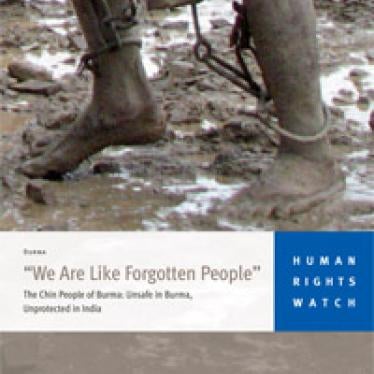"You are living under our authority. You have no choice. You must do what we say."
This is what Burmese soldiers told a woman who was sick of portering their army supplies. She told Human Rights Watch, "I tried to refuse to go because I was so tired and the things we are made to carry are very heavy. When I tried to refuse, they beat me."
This story could have come from almost anywhere in military-ruled Burma, but it is from one of the most isolated and neglected parts of the country, in the western borderlands with India. Chin State's mountainous jungle villages are home to nearly half a million ethnic Chin people. These predominantly Christian, deeply impoverished people are completely under the boot of the Tatmadaw, or Burmese army.
Chin State is a microcosm for the patterns of oppression in rural Burma. The army and civilian officials there routinely commit abuses -forced labor, land and food confiscation, arbitrary beatings, recruitment of child soldiers, and torture. The State Peace and Development Council (SPDC), the military government, rules the population by denying them their basic freedoms.
Scores of military camps are scattered throughout the state, in main towns, along roads, and in the hills. Many Chin people see the army as frightening bandits, and the soldiers see the community around them as a resource to exploit and repress. One Baptist pastor told Human Rights Watch: "When we meet the army we are shaking. There's no law for them. Whatever they want is law."
Too often, the Burmese army arbitrarily arrests, beats and tortures Chin people, accusing them of alliance with a small resistance group, the Chin National Front, or its armed wing, the Chin National Army. Yet sometimes villagers accuse the CNA of harassing, beating, and extorting money from them as well.
In a three-year investigation into abuses in this forgotten corner of Burma, Human Rights Watch researchers found that systematic abuses by the Tatmadaw are causing people to flee the country. People find it hard to grow crops, travel between villages, attend school, and practice their religion.
The Chin face religious repression. At times the Tatmadaw has burnt down churches, demolished crosses and prayer rooms to make way for military buildings and infrastructure. Villagers are intimidated to convert to Buddhism.
The situation has become even more desperate with a famine affecting large parts of the state. A natural phenomenon in which bamboo "flowers" attract a plague of rats is currently destroying crops. The food situation, already difficult because of Burmese army plundering, has becoming desperate. According to the United Nations, 70% of the people in Chin State live below the poverty line and 40% lack access to adequate food sources. As elsewhere in Burma, a handful of international agencies are permitted to operate, but only within the rigid confines of the military controlled "humanitarian space."
Abuses and the impact of the famine, made worse by the military government's policies and practices have led tens of thousands of Chin to flee, many cross the border to neighboring Mizoram State in India. India has largely neglected the Chin, as it pursues business concessions in Burma and border security cooperation.
In Mizoram State, Chin from Burma face discrimination in housing, education and jobs. Local nationalist groups aided by local authorities have at times forced the Chin back across the border. Only those who travel all the way to New Delhi can register with the United Nations refugee agency to seek refugee status, but they are often stranded for years waiting for resettlement in another country. One Chin man told us that in India, "I am like a prisoner. Even though India is the biggest democratic country, staying in India is like staying in prison: no freedom, no happiness, no money to take care of my family." Thousands of others make long and dangerous journeys to Malaysia and Thailand.
In listening to the voices of the Chin we can hear the patterns of repression from all over Burma. For a long time, Human Rights Watch has called on Burma's military government to stop abuses and repression against ethnic minorities. But only pressure from other countries, most notably China and other major trading partners with Burma, will make this happen. Likewise, India should protect Chin who flee across the border.
That these abuses happen far from Delhi and Rangoon is one reason why the rights of the Chin are neglected. It's up to the rest of the world to tell Burma and India that mistreating the Chin is not an option.
Elaine Pearson is deputy Asia director at Human Rights Watch.







